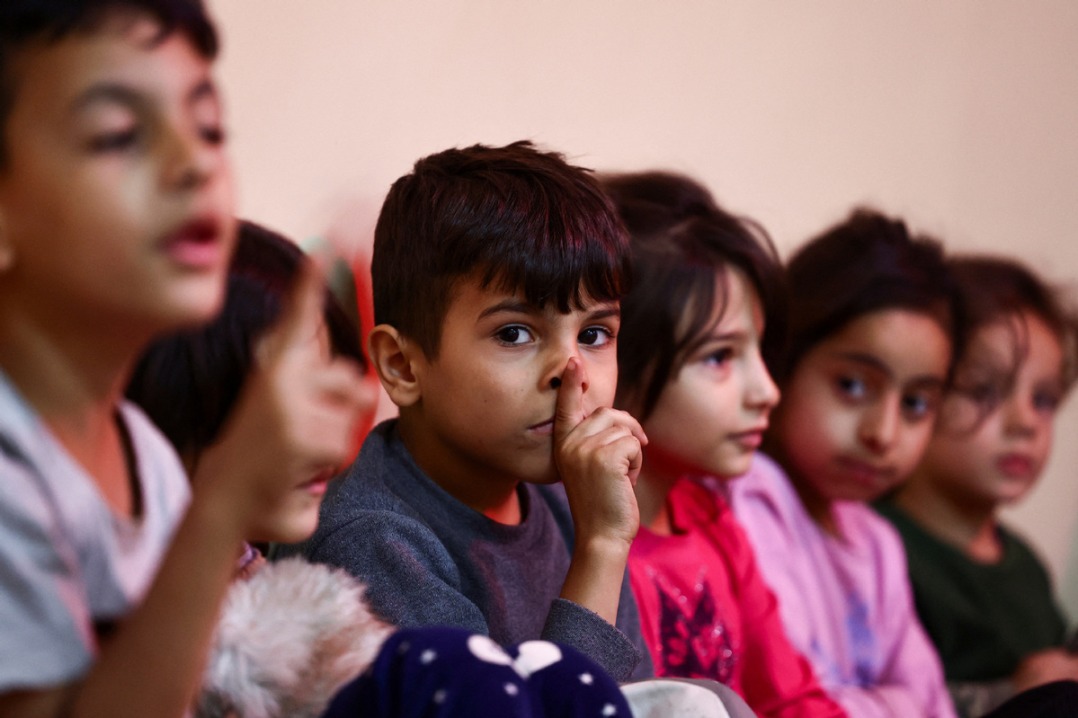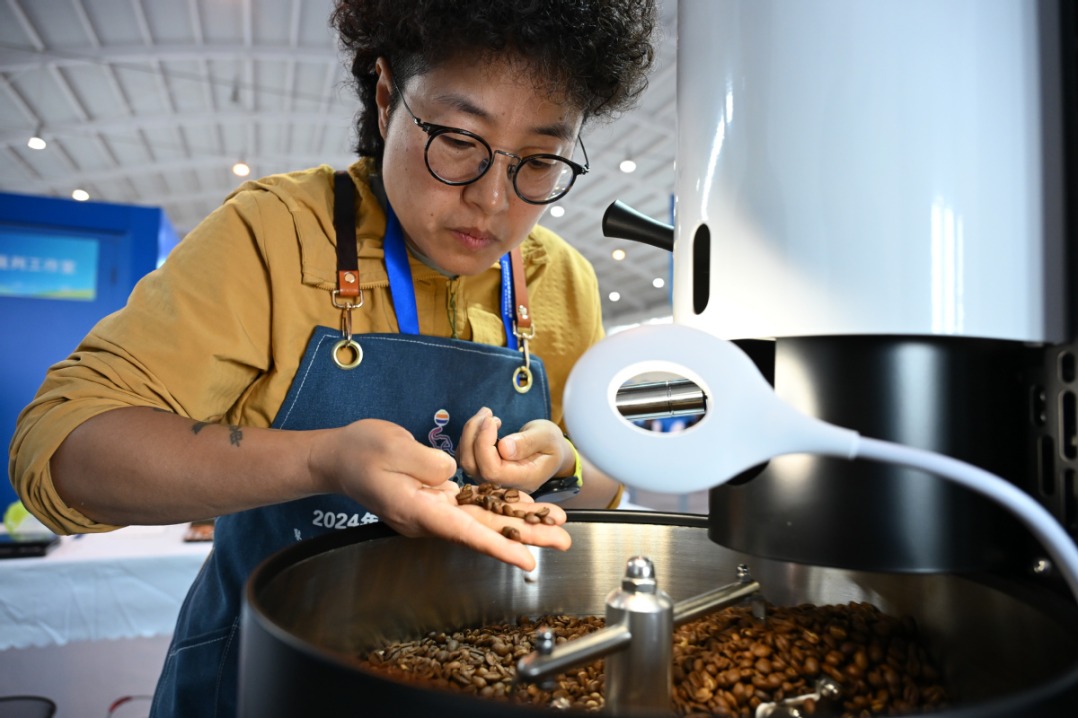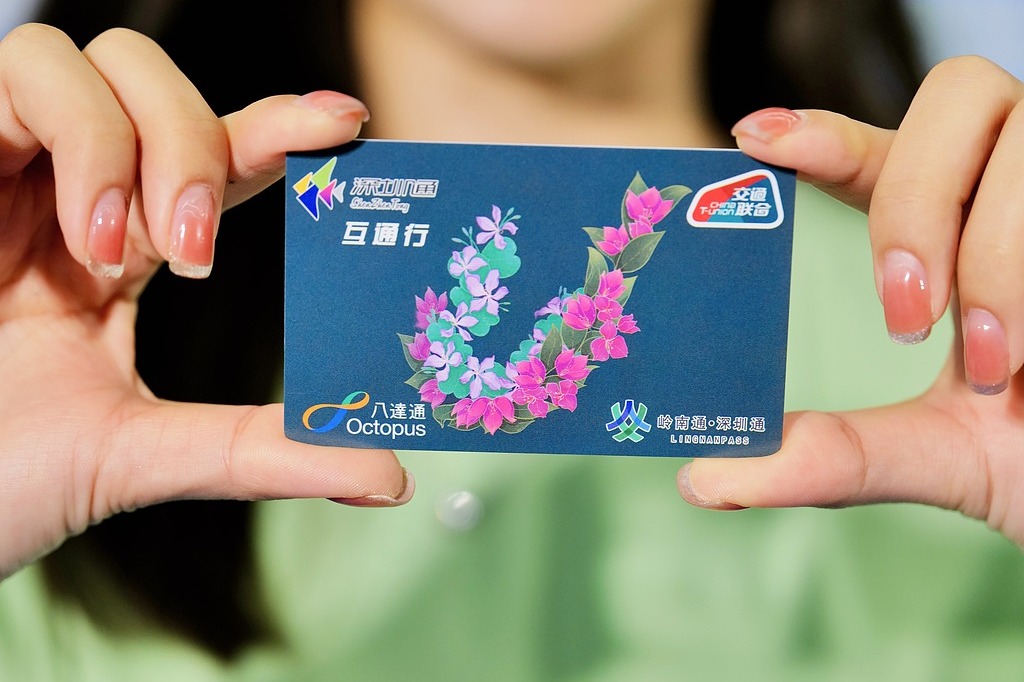Bridging generations
Young people in China are actively engaging in initiatives to assist the elderly, addressing the challenges seniors face in a rapidly evolving society.


While shared bikes and power banks have become a common part of daily life, a new and heartwarming trend is emerging: the concept of "shared children".
In a video posted in July, 28-year-old vlogger Feng Xiaogang documented two days of assisting elderly individuals. Wearing a shirt that read "Shared Son" on the front and "Feel free to ask for help; I'm here to assist" on the back, Feng aimed to bridge the gap between seniors and modern technology, highlighting their struggles in today's fast-paced world.
He discovered that some elderly people had trouble distinguishing between self-service registration machines and those for accessing test results in hospitals. Despite the help of young volunteers, there is still a significant lack of assistance for the large elderly population.
In the video, Feng shared his plan to invite 100 young people to join the "Mutual Assistance Initiative for Other People's Parents".The idea was for participants to support elderly travelers by offering help with tasks like carrying luggage or using smart devices.
He also discussed with a young programmer the possibility of using technology — through an app or a mini-program — to connect elderly travelers in need with young volunteers willing to assist.
"This idea takes 'shared children' beyond just a concept or a single video — it makes it a practical reality," he said.
Feng wasn't the first to take this step. He was inspired by a recent trend on social media, where young people voluntarily help each other's parents when they're away from home.
On the Chinese lifestyle platform Xiaohongshu, the topic of "Mutual Assistance Initiative for Other People's Parents" has garnered 40 million views. Over 40,000 users have shared stories of aiding elderly individuals or seeking help for their parents traveling solo.
Forgotten voices heard
Qingmei (pseudonym) is a part-time writer of memoirs for the elderly. Under the nickname "Memoir Writer Qingmei" on Xiaohongshu for over a year, the 37-year-old has completed over 10 memoirs, primarily focusing on individuals over 60.Her usual clients are the children or grandchildren of these seniors, often in their 20s or 30s.
When Qingmei started writing memoirs for the elderly, she noticed a lack of similar services on Chinese websites.
"Traditional Chinese people are often more reserved and humbler, believing that only a supposedly successful life is worth recording," she explained. "But I think the lives of regular people also deserve to be seen."
Qingmei often feels that sharing and listening during her face-to-face interviews bring the elderly more enduring joy than the final book itself.
"Their emotional needs are similar to those of young people; they desire new experiences and want to stay updated on what's happening in the world today," she said.

Youth involvement
Recent data from the National Bureau of Statistics revealed that by the end of 2023, individuals aged 60 and older represented 21.1 percent of China's total population.
To build an elderly-friendly society, ensuring universal access to basic care services is essential. In 2024, according to the Ministry of Civil Affairs, the central government has allocated 5.48 billion yuan ($775 million) to enhance elderly care services.
Despite these efforts to attract young talent, more involvement from the younger generation is still needed.
Huang Wei, 38, has spent six years working in the elder care field. Managing a nursing home in Yangzhou, Jiangsu province, she also provides home-based care services in Beijing.
In 2023, she began posting videos on social media, reviewing elder care facilities and products from a professional perspective. Over the past year, she and her team have researched over 500 elder care facilities in Beijing through publicly available information and personally visited nearly a hundred.
According to her, the average age of nursing home residents is over 85, and many face health challenges such as full or partial dementia or disabilities. "It's likely that seniors will spend their final years in these nursing homes," she said, feeling the significance of her work.
Huang noted that while more young people are entering the elder care field, their involvement — especially among highly educated individuals — is still limited compared to other sectors.
"Most caregivers are around 50 years old," she observed, adding that few young people are willing to take on basic tasks like assisting seniors with personal care and hygiene.
As a result, Huang has been closely following the development of elder care robots and assistive devices, including electric wheelchairs and stair-climbing equipment.
"I hope every elderly person can spend their final moments with dignity," she said.
In addition to nursing homes, home-based care is another key approach to elder care, which makes age-friendly home modifications essential for ensuring seniors can live safely and comfortably.
Pan Shuna, 24, currently pursuing her master's degree at Sun Yat-sen University in Guangdong, started a group on the Chinese review site Douban in 2022 to discuss home modifications for seniors.
To her surprise, over 100 people joined the group on the first day. A month later, it was highlighted on the home page of the Douban app, leading to a rapid increase in membership, which has now surpassed 37,000. Notably, most members are in their 20s and 30s, reflecting Douban's younger user base.
"If young people understand the anxiety of aging in a rapidly changing world, they'll be more empathetic and engaged with this issue," Pan explained.
In the group, some young members seek advice on adapting their homes for elderly parents, while others share their experiences installing assistive tools or emergency call systems.
Among these discussions, Pan keenly observed that many solutions for the elderly often involve repurposing products originally designed for babies or children. For example, soft foods for seniors might be replaced with infant formulas, and mobile emergency monitoring systems could be substituted with children's smartwatches.
"While both groups share certain limitations, the market tends to focus more on newborns than on providing specialized equipment for the elderly," she said.
Pan emphasized that improving modifications for seniors requires a fundamental shift in mindset. She noted that many elderly-friendly modes on apps and smart devices make only superficial changes, such as enlarging fonts or adding voice features, while the core functions remain too complex for elderly users to understand.
"For example, the 'settings' button on an app is often shaped like a gear, but these abstract symbols can confuse seniors," she explained.
Pan pointed out that, in daily life, the issue still lacks widespread advocacy among younger generations. She believes everyone can make a difference in their professions simply by recognizing that seniors, who may struggle with new technology and rapid changes, are among their potential users or clients.
"Only by integrating seniors into our world can we design products that truly help them," Pan said. "Aging is inevitable for all of us, so making our environments more senior-friendly is ultimately preparing for our own future."

Today's Top News
- EU taking wrong path of protectionism by imposing hefty tariffs on Chinese EVs
- Chinese mainland to further enhance access for Taiwan compatriots
- China against latest US' restrictive investment measures
- Shenzhou 19 mission a journey of progress
- Detailed fiscal package set to be unveiled
- Potential for Sino-Russian cross-border co-op high






























